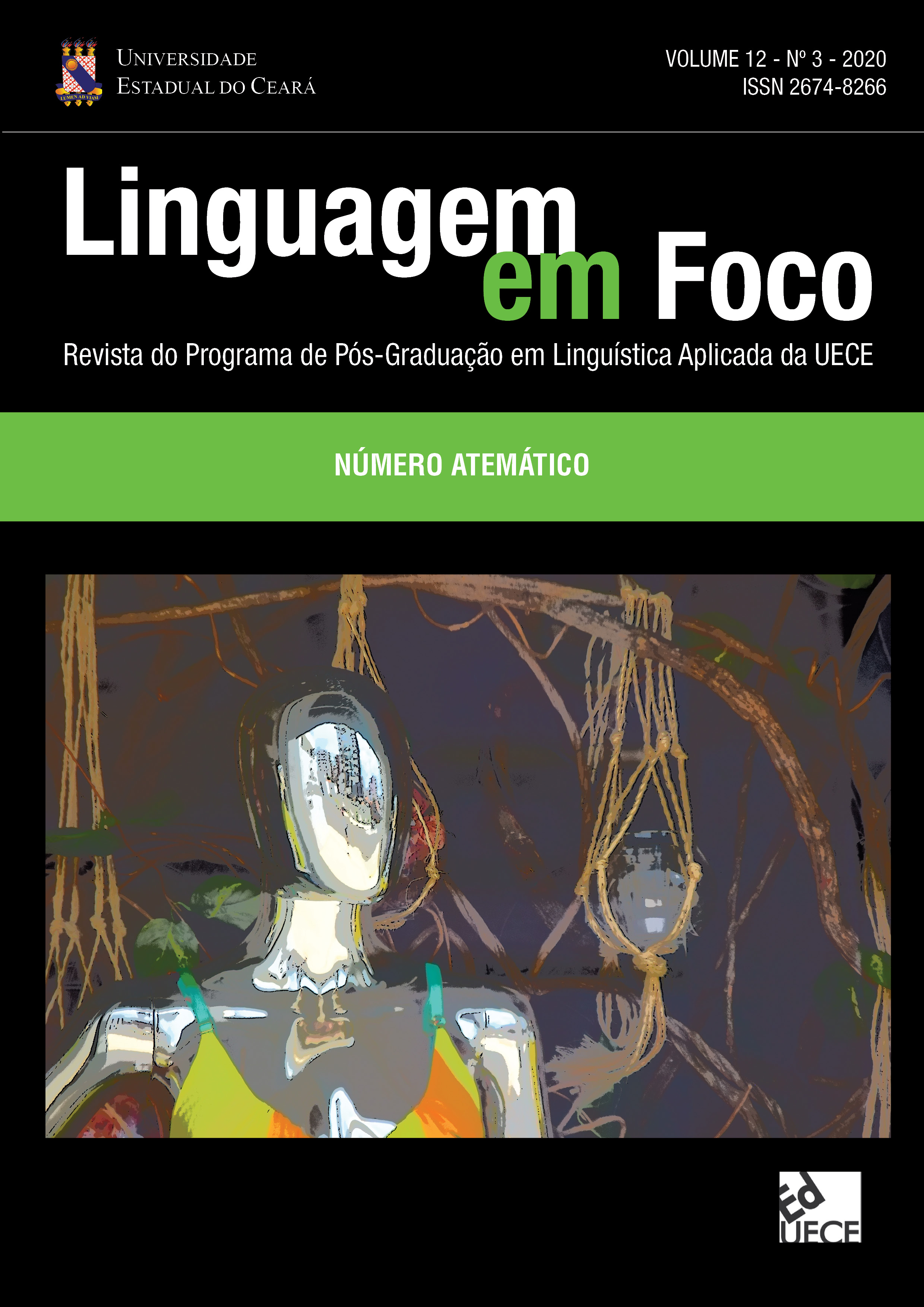A proposal for the critical analysis of the meme as a genre in Portuguese language classes
DOI:
https://doi.org/10.46230/2674-8266-12-4155Keywords:
Genre, Meme, Critical awareness, Genre pedagogyAbstract
The advent of the Digital Information and Communication Technologies have given rise to new reading and writing practices. These new practices have generated concerns about how the school, one of the main literacy agencies, can appropriate the necessary resources to guarantee significant teaching-learning processes that are consistent with the demands of contemporary society. In the field of Applied Linguistics, studies such as those by Ribeiro (2015) and Rojo and Moura (2012) suggest the need to create methodological strategies that allow the development of student literacies, in line with what is recommended in education guidelines in the country, such as the National Common Curricular Base (BRASIL, 2018). Thus, this article presents a pedagogical proposal for a critical approach of the meme as a genre in a Portuguese language classroom, aimed at students in the final years of elementary school. The objective of the work is to propose a reflexive study of the genre in order to awaken the critical awareness of the students, through the analysis of the meme according to the particle, wave and field metaphors. To this end, a theoretical contribution based on Rhetorical Genre Studies (BAZERMAN, 2006; MILLER, 2012) is adopted, together with methodological procedures based on a triple pedagogy (DEVITT, 2009) for the teaching and critical learning of genre. As a result of the implementation of the proposal, students are expected to perceive genre not only as an isolated entity, but also in its interrelationships with previous genres and situated in specific contexts.
Downloads
References
BAWARSHI, A.; REIFF, M. J. Gênero: história, teoria, pesquisa, ensino. São Paulo: Parábola Editorial, 2013.
BAZERMAN, C. Gêneros, agência e escrita. São Paulo: Cortez, 2006.
BEZERRA, B. G. Gêneros no contexto brasileiro: questões (meta)teóricas e conceituais. São Paulo: Parábola Editorial, 2017.
BEZERRA, B. G. Teorias de gênero e perspectivas para o ensino: breve panorama ilustrado. Revista da Anpoll, v. 1, n. 52, p. 45-57, 2020.
BHATIA, V. K. A análise de gêneros hoje. In: Gêneros e sequências textuais. BEZERRA, B. G.; BIASI-RODRIGUES, B.; CAVALCANTE, M. M. (org.). Recife: Edupe, 2009. p. 159-195.
BHATIA, V. K. Worlds of written discourse: a genre-based view. London: Continuum, 2004.
BRASIL. Base Nacional Comum Curricular: Educação Infantil e Ensino Fundamental. Brasília: MEC/Secretaria de Educação Básica, 2018. Disponível em: http://basenacionalcomum.mec.gov.br/images/BNCC_EI_EF_110518_versaofinal_site.pdf. Acesso em: 18 jun. 2020.
CANI, J. B. Multimodalidade e efeitos de sentido no gênero meme. Periferia, v. 11, n. 2, p. 242-267, maio/ago. 2019. Disponível em: https://www.e-publicacoes.uerj.br/index.php/periferia/article/view/36955. Acesso em: 16 maio 2020.
CAVALCANTE, M. M.; OLIVEIRA, R. L. O recurso aos memes em diferentes padrões de gêneros à luz da Linguística Textual. Desenredo, v. 15, n. 1, p. 8-23, jan./abr. 2019.
DAWKINS, R. O gene egoísta. São Paulo: Companhia das Letras, 2007.
DEVITT, A. J. Teaching critical genre awareness. In: BAZERMAN, C.; BONINI, A.; FIGUEIREDO, D. (ed.). Genre in a changing world. Fort Collins/West Lafayette: The WAC Clearinghouse/Parlor Press, 2009. p. 337-351.
DUDENEY, G.; HOCKLY, N.; PEGRUM, M. Letramentos digitais. São Paulo: Parábola Editorial, 2016.
LARA, M.; MENDONÇA, M. O meme em material didático: considerações sobre ensino/aprendizagem de gêneros do discurso. Bakhtiniana, São Paulo, v. 15, n. 2, p. 185-209, abril/jun. 2020. Disponível em: https://www.scielo.br/scielo.php?pid=S2176-45732020000200185&script=sci_arttext. Acesso em: 16 maio 2020.
LIMA-NETO, V. Um estudo da emergência de gêneros no Facebook. 2014. 309 f. Tese (Doutorado em Linguística) – Universidade Federal do Ceará, Fortaleza, 2014.
MARCUSCHI, L. A. Gêneros textuais emergentes no contexto da tecnologia digital. In: MARCUSCHI, L. A.; XAVIER, A. C. (org.). Hipertexto e gêneros digitais: novas formas de construção de sentido. São Paulo: Cortez, 2010. p. 15-80.
MARCUSCHI, L. A. Produção textual, análise de gêneros e compreensão. São Paulo: Parábola Editorial, 2008.
MILLER, C. R. Gênero textual, agência e tecnologia. São Paulo: Parábola Editorial, 2012.
MORAN, J. Ensino e aprendizagem inovadores com apoio de tecnologias. In: MORAN, J.; MASETTO, M.; BEHRENS, M. A. (org.). Novas tecnologias e mediação pedagógica. Campinas: Papirus, 2013. p. 11- 72.
OLIVEIRA, U. Meme: gênero e prática de ensino pela sequência didática. Entretextos, Londrina, v. 19, n. 2, p. 63-89, 2019. Disponível em: http://www.uel.br/revistas/uel/index.php/entretextos/article/view/34469. Acesso em: 16 maio 2020.
PERNAMBUCO. Secretaria de Educação. Currículo de Pernambuco: Educação Infantil e Ensino Fundamental. Área de linguagens. Recife, PE, 2018.
RECUERO, R. Memes em weblogs: proposta de uma taxonomia. Revista FAMECOS, v. 32, p. 23-31, 2007.
RECUERO, R. Redes sociais na internet. Porta Alegre: Sulina, 2018.
REINALDO, M. A.; BEZERRA, M. A. Gêneros textuais como prática e seu ensino. In: REINALDO, M. A.; MARCUSCHI, B.; DIONÍSIO, A. P. (org.). Gêneros textuais: práticas de pesquisa, práticas de ensino. Recife: Ed. Universitária UFPE, 2012. p. 73-96.
RIBEIRO, A. E. Tecnologia e poder semiótico: escrever, hoje. Texto Livre, v. 8, n. 1, p. 112-123, 2015. Disponível em: http://www.periodicos.letras.ufmg.br/index.php/textolivre/article/view/8681. Acesso em: 30 set. 2020.
ROJO, R. H. R.; MOURA, E. (org). Multiletramentos na Escola. São Paulo: Parábola Editorial, 2012.
Published
How to Cite
Issue
Section
License
Authors who publish in Linguagem em Foco Scientific Journal agree to the following terms:
- Authors retain the copyright and grant the journal the right of first publication. The articles are simultaneously licensed under the Creative Commons Attribution License which allows sharing the work with an acknowledgement of its authorship and initial publication in this journal.
- The concepts issued in signed articles are the absolute and exclusive responsibility of their authors. Therefore, we request a Statement of Copyright, which must be submitted with the manuscript as a Supplementary Document.
- Authors are authorized to make the version of the text published in Linguagem em Foco Scientific Journal available in institutional repositories or other academic work distribution platforms (ex. ResearchGate, Academia.edu).





























